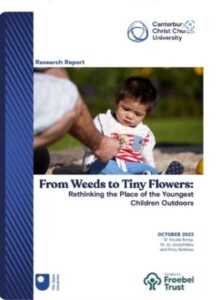
In this post Jo Josephidou talks about her latest work with the Froebel Trust which looks at outdoor practices with very young children.
We are all familiar with the ubiquitous message about the importance of children being outdoors and especially opportunities for them to engage with nature. But if you were asked to picture a young child outdoors, what kind of image would you conjure up? A child jumping in puddles, kicking through leaves or balancing on a log? Most probably a child who is older than two. But what about the youngest children – say those aged birth to two – do they not also need similar time and opportunities?
Generally we have found that this very youngest age group are excluded from practice, policy and research which focuses on children’s opportunities to engage with the outdoors and nature. We have discussed this issue before on this blog where we reported on outdoor practices with very young children in the early years setting, home and community. Our very latest Froebel funded report, From Weeds to Tiny Flowers, offers some new insights into different cultural and geographical practices.
Using the metaphor of weeds to talk about young children may seem a particularly odd choice. However we have borrowed this term from the work of Jenks (2005) who uses it to illustrate how children can often be perceived as being in the wrong place at the wrong time! This is particularly apt when talking about very young children who are often seen as out of place outdoors because this space is seen as a space for children who can run through puddles or climb on logs, but a place of danger for those who are too young to be active in this way.
We noticed in our review that exclusion was not just limited to very young children but that there were several other factors that interacted with each other which led to even more issues of exclusion on the grounds of class, socio-economic status and culture. Another area of exclusion that we also noticed was that the voices who talked about outdoor practices with very young children came mostly from Europe and North America. We are interested to see how other cultures speak about being outdoors and what we can learn from them in terms of pedagogies for very young children.
In fact this finding has informed the piece of research we are working on presently. We are looking to talk to parents from a range of cultural backgrounds to learn about their experiences with their children outdoors whilst living in an urban setting. We will update you as we progress with our findings.
Do please have a look at our lovely FREE OpenLearn course which is based on our research up to this point, focusing on very young children’s opportunities to be outdoors and in nature.
References
Jenks, C. (2005) Childhood. London: Routledge
